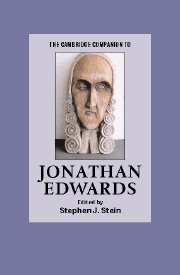Book contents
- Frontmatter
- Introduction
- Part I Edwards’s life and context
- Part II Edwards’s roles and achievements
- Part III Edwards’s legacy and reputation
- 11 Evangelical tradition in America
- 12 The reputation of Edwards abroad
- 13 Edwards and American literature
- 14 Edwards in “American culture”
- 15 Edwards’s intellectual legacy
- 16 Edwards and social issues
- The Works of Jonathan Edwards
- Further Readings
- Index
- Series List
13 - Edwards and American literature
from Part III - Edwards’s legacy and reputation
Published online by Cambridge University Press: 28 November 2007
- Frontmatter
- Introduction
- Part I Edwards’s life and context
- Part II Edwards’s roles and achievements
- Part III Edwards’s legacy and reputation
- 11 Evangelical tradition in America
- 12 The reputation of Edwards abroad
- 13 Edwards and American literature
- 14 Edwards in “American culture”
- 15 Edwards’s intellectual legacy
- 16 Edwards and social issues
- The Works of Jonathan Edwards
- Further Readings
- Index
- Series List
Summary
Jonathan Edwards published his many sermons and books a century before anyone devoted a substantial work to the topic of “American literature ” and even longer before the subject existed as an academic discipline. Indeed, in his day no one even conceived the category “American literature. ” Like Cotton Mather, Benjamin Franklin, and other representatives of what subsequently was termed, first, “colonial American literature ” and then “early American literature, ” Edwards was an Englishman in British North America, a provincial who labored on the periphery of empire. When such a colonist wrote, it was as an Englishman, to be read across the Atlantic as well as by fellow colonists. Edwards explicitly acknowledged this dual audience, reminding himself in one of his early notebooks, “Before I venture to publish in London, to make some experiment in my own country, ” and thus “to play at small games first, that I may gain some experience in writing. ” Beginning in the 1730s he began to realize this plan, publishing his first sermon in Boston and a few years later having the first edition of his Faithful Narrative of the Surprising Work of God in the Conversion of Many Hundred Souls in Northampton issued in London under the sponsorship of the prominent Nonconformist clergymen Isaac Watts and John Guyse. By the time of his death in 1758 Edwards had, indeed, become a participant in Europe's larger intellectual conversation, an English thinker of the first rank.
- Type
- Chapter
- Information
- The Cambridge Companion to Jonathan Edwards , pp. 262 - 279Publisher: Cambridge University PressPrint publication year: 2006
- 2
- Cited by



